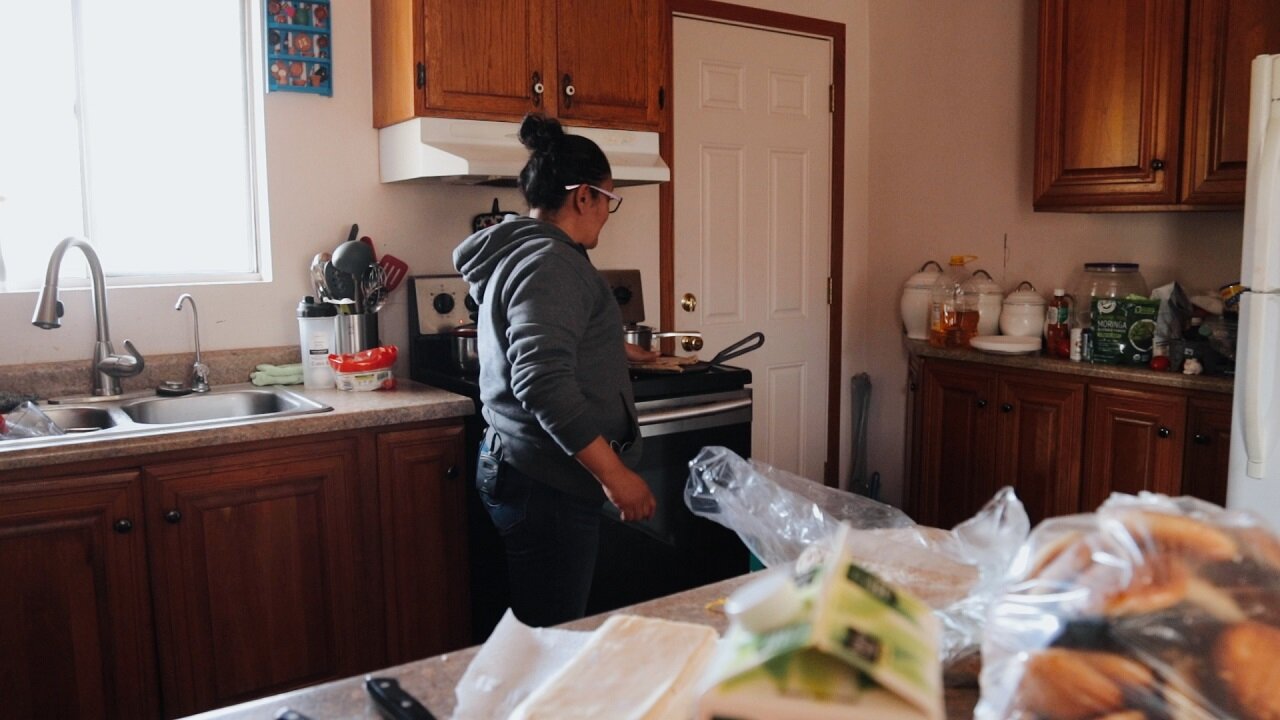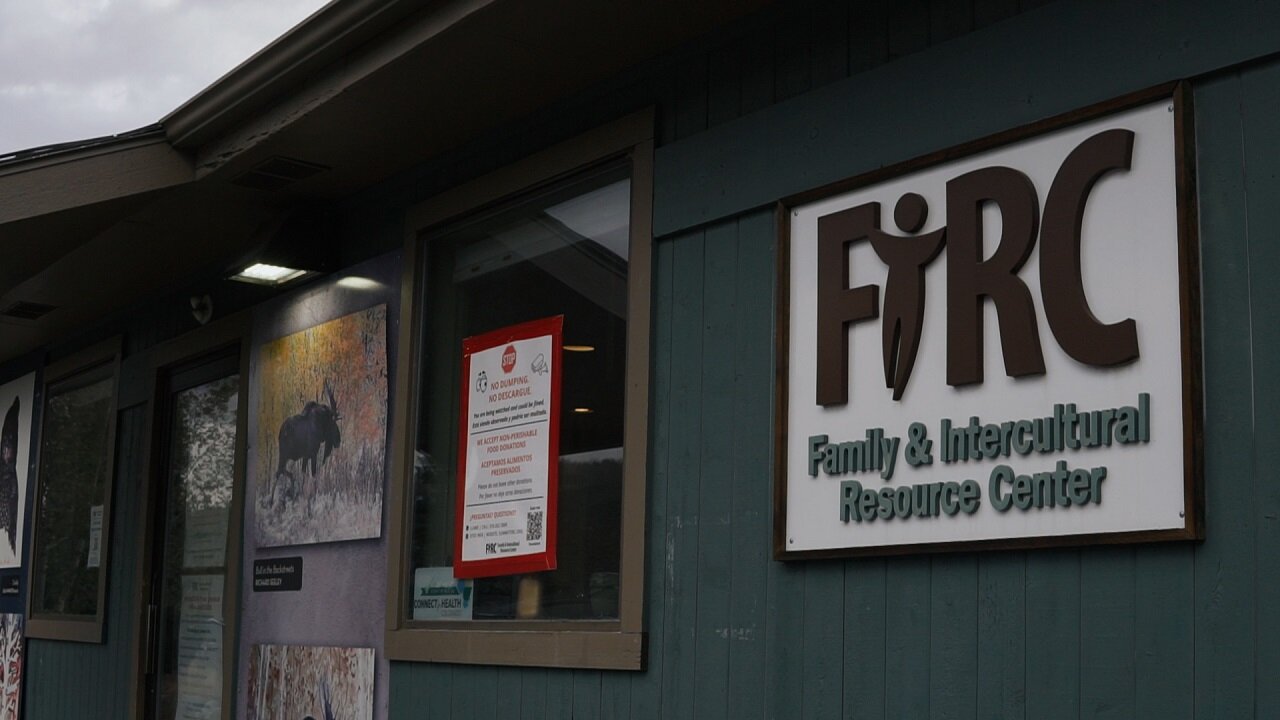After two decades in Silverthorne, family forced to seek rental assistance for the first time

SILVERTHORNE, Colo. — After living in apartments for 17 years while raising four daughters, Maria Elsa Castillo Fernandez couldn’t be happier she has been living in a home for the past two years. But that happiness is in jeopardy.
Fernandez's current housing is month-to-month, meaning at any time the owner could decide to sell.
“That is the fear: that one day she [the owner] says she wants to sell the house, so we don't have a place to go. So that is the biggest fear…also for my kids,” Fernandez said while she spoke with Rocky Mountain PBS in Spanish.
Two of Fernandez's daughters still live at home and are often the thankful recipients of homemade snacks and meals. On a typical day in October when Rocky Mountain PBS visited the Fernandez home, Jasmine and Kelly sat at the table waiting for their quesadilla made with cheese from Mexico on a pan Fernandez has owned for 17 years. Cooking for her family is one of her favorite activities.
“The kitchen, that is my favorite part of the house,” explained Fernandez. “We left the apartment because the rent was too expensive, and the apartments were not in good condition, and also my girls grew up. We needed a space for them."

Even though the Fernandez family was able to find a more affordable and better place to live, the pandemic changed everything. Her husband is a construction worker and his job can be very “up and down” depending on the season and the weather, she explained. Fernandez works as a housekeeper but has had to take some time off to take care of her youngest daughter, a five-year-old with asthma. On top of that, work for housekeepers slowed significantly during COVID shutdowns.
“It was a hard time, not just for me, but for everyone,” said Fernandez. “There was one time that we didn't have the money for rent, and FIRC helped me, and I was very happy with the program.”
FIRC is the acronym for the Family Intercultural Resource Center. The organization that has been serving Summit County since 1993, providing more localized assistance. FIRC is a social services agency that helps families find success in the area by providing clothing, rental assistance, food and help with physical or mental health challenges. The organization has also seen first-hand the real impacts of the housing crisis in the mountains.

“We are experiencing housing shortages like we have never before. And it's been really, really difficult on the people that are trying to work and live here, making our job very busy,” said Brianne Snow, the executive director at FIRC.
Snow has lived in Summit County for the last 25 years. She has been with FIRC for 16 of those years, and took over as executive director just before the pandemic began.
“There has always been what we have called 'housing issues' and affordable housing was definitely hard to come by, but the pandemic pushed it into a true crisis,” said Snow.
In the last two years, Fernandez said she’s seen the rent prices more than double.
“An apartment used to be $1,000 [in] rent two years ago. It [has] increased to $2,200,” Fernandez explained.
According to the independent website Rent Data, the average price for a one bedroom apartment in Summit County is more than $1,300. The median household income for the county is $86,570, and individual median income is $77,754 according to the Bureau of Economic Analysis, which used 2020 census data.
Buying a home in the county is also out of the question for many; National Association of Relators data show the median house price is $664,794, an 11.2% increase over the last year.
There are several theories or points of blame for why these prices have jumped dramatically. The most common ones are increased building costs, remote workers, and short-term rentals (STR).
“I think when the pandemic hit a lot of people that were living paycheck to paycheck ended up not being able to afford to live here. And so, they moved and other people who had always enjoyed coming to the mountains to visit all of a sudden had an opportunity to work remotely,” Snow explained. “They came and took that housing stock but [are] not really contributing to our local workforce making it a more complicated situation.”
Now businesses in Summit County and other areas of the mountains face extremely difficult circumstances: they have job openings but no workers to fill them. Snow said she has heard of many stories where businesses offer jobs to prospective employees, but then the workers are not able to find affordable housing and are unable to accept the job. Snow cautioned the whole state and visitors from out-of-state that this is not sustainable.
“It's not going to be fun to come up here if … nobody works or lives up here,” said Snow. She also shared stories where essential workers are resorting to non-traditional forms of housing just to live in the area.
“We can't have teachers living in hotel rooms and your pharmacist assistant living in a car at a trail head. It just doesn't make for the community that we want,” said Snow.
Most recently, an example of a hit to the Silverthorne community was the sale of a plot of land that two mobile home parks currently. The new owners plan to redevelop the spot into condos. Residents are worried they won’t be able to stay in the community with another piece of affordable housing leaving. The Summit Daily reported the residents expressed their concerns to Silverthorne Town Council in late October.
Snow told Rocky Mountain PBS this constant fear and anxiety of losing housing can really impact the community members.

“Having long-term housing, it is the fabric of what you need in order to feel successful and safe in a community," explained Snow. “And when you feel like your housing might be pulled out from under you, or that you're one paycheck away from potentially losing your home, that's a very stressful situation. And that impacts the way you show up to work. It impacts the way you parent, it impacts the way that you show up as a community member.”
It is a fear Fernandez is familiar with. She knows her housing situation could change at any moment, and with the current rent and housing prices, that would mean leaving this place she loves.
“All my life was built here in Silverthorne,” said Fernandez. “I'll be scared to move out from Silverthorne, because I have been here for 20 years, and it is going to be hard to move to another state, with new laws, new things, new people. It would be hard.”
Snow said she thinks there has to be a wide range of solutions to tackle the complicated issue of housing. FIRC runs a program where they communicate with STR owners and convince them to turn the properties into long-term rentals. FIRC then matches a family to that home. The way those owners are “convinced” is through a property management company which gives them discounted rates.
Other ideas for solutions include capping or regulating STRs, so they take up less of the housing stock. Census data from 2020 shows the percent of occupied housing units in Summit County is just 41.3 percent, meaning there are a lot of units sitting empty.
A Frisco resident recently tried to get a petition under the town council’s consideration, but it failed to get the necessary number of signatures from registered voters.
Fernandez would like to see more housing built, “to help not just Latinos, but everyone who makes less money. That would be great because we can…be stable in one place.”
She told Rocky Mountain PBS she would love for her future to include buying a house of her own in Silverthorne because ultimately, this is her home.
“As long as they don't get me out of here, I won't move from Silverthorne. I won't leave Silverthorne for any other place,” said Fernandez. “I like it here a lot.”

Amanda Horvath is a multimedia producer with Rocky Mountain PBS. You can email her at amandahorvath@rmpbs.org.
Alexis Kikoen is a multimedia journalist at Rocky Mountain PBS. You can reach her at alexiskikoen@rmpbs.org.